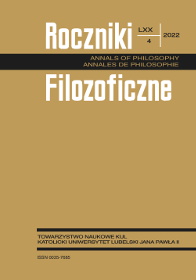SPINOZA’S CRITIQUE OF RELIGIOUS INTOLERANCE
SPINOZA’S CRITIQUE OF RELIGIOUS INTOLERANCE
Author(s): Przemysław GutSubject(s): Social history, Early Modern Philosophy, Contemporary Philosophy, 17th Century, Sociology of Religion
Published by: Towarzystwo Naukowe KUL & Katolicki Uniwersytet Lubelski Jana Pawła II
Keywords: Spinoza; religion; intolerance; prejudice; superstition; clericalism;
Summary/Abstract: This article presents a new interpretation of Spinoza’s account of religious intolerance. According to Rosenthal and Steinberg Spinoza explains the origins of religious intolerance in two ways. The first is in the Ethics, which is grounded on the affect of ambition; the second in the Theological-Political Treatise, which is based on the opposed affects of fear and hope. I agree with this interpretation, yet I considerably modify and supplement this account. The interpretation I propose rests on the observation that in order to understand Spinoza's view we need to draw the subtle distinction between the explanation of the psychological causes of religious intolerance and the elucidation of why religious intolerance appears to appeal so much. First, I shall discuss Spinoza’s account of the origin of religious intolerance. Second, I shall discuss what it is about us, according to Spinoza, that makes us exposed to religious intolerance. Third, I shall consider the measures which, in his view, should be taken in order to curb religious intolerance effectively.
Journal: Roczniki Filozoficzne
- Issue Year: 70/2022
- Issue No: 4
- Page Range: 319-363
- Page Count: 45
- Language: English

